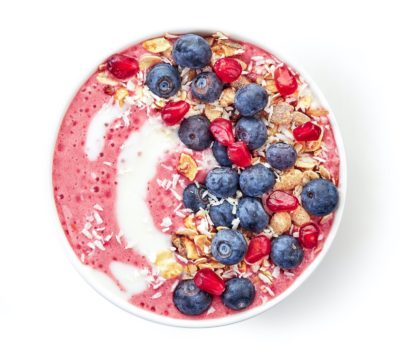Ready to not only have less bloating, discomfort, reflux or bowel issues but also improve chemical levels of inflammation in your gut? The mind-body and gut brain connection is that powerful.
Let’s be clear, it is NOT all in your head. You aren’t causing your digestive symptoms, and I work with clients all the time who’s medical team has not taken very physical issues seriously because of depression, anxiety, or stress. But….as we’ll see the gut brain connection is tightly wound. We can improve what your gut does by harnessing that connection.
Our enteric (gastrointestinal) nervous system is second only to the brain in the number of nerve cells. The small intestine alone has over 100 million nerve cells, the same amount as you’d find in the spinal cord! This explains why our gut “feelings” can be so strong. Our brain and gut have a two way conversation – so while the brain does send signals to tell our gut what to do and when to do it, our gut also sends important signals to our brain about bacterial invaders, nutrient status, stress levels and more. On top of all of this, the bacteria in our gut talk to that enteric nervous system which tells our gut to up or down regulate immune activation, inflammation and other warning systems that influence both how our gut feels, but how our brain and mood respond too.
The downside? Physical (illness, injuries, chronic pain) and emotional stress can all trigger digestive reactions from the gut brain connection.
The upside? Aside from good nutrition, we can also use targeted stress management strategies to soothe an unhappy gut! This is another tool in the toolbox to get you feeling good, especially if symptoms are stubborn.
So now that we know how big the impact stress can be on our gut, let’s look at 3 research backed ways to get your gut feeling better.
Diaphragmatic Breathing and Acid Reflux (and IBS)
This one is quick, cheap and cheerful! Our diaphragm is the muscle that separates our chest and abdominal cavities, it also plays a key role in keeping our stomach contents in our stomach! Stressed humans breathe more shallowly, and this can reduce the function and strength of the diaphragm (like all muscles it needs to be moved and stretched regularly to stay healthy), which alters the function of our Lower Esophageal Sphincter (the little ring of muscles between your esophagus and your stomach). A number of studies have shown significant improvements using deep breathing techniques to tune up the diaphragm and reduce symptoms of acid reflux.
Other studies have shown improvements with deep breathing and IBS as well, given the significant nervous system involvement in symptoms (it’s definitely not just what you’re eating)! If you’re having a stressful day, try deep breathing to help soothe your jacked up nervous system and keep your “stress gut” at bay.
How to: The goal is to get full, deep, belly breaths. There is no one right way, but I find focusing on filling up my belly first, then allowing my ribs to expand out to the sides (instead of just the chest heaving up and down) helps me get a deeper breath. Breathe in for a count of 4-6, pause, then breathe out slowly and completely. Repeat for 6-10 breaths. There’s a great video walking you through here!
For reflux specifically, try 6-10 breaths 3 times per day. If you have “stress gut” or know it’s coming just do it as often as you remember to help calm the fires.
Mindfulness or Meditation Training
We started this chat over on Instagram, but let’s dive deeper here. There is HEAPS of evidence on various mindfulness training interventions to use the gut brain connection to our advantage. These include: yoga, meditation, and general mindfulness. All of the successful studies included a practice component, these aren’t just tools you can take out and use when you’re stressed or your gut is cranky. You need to practice using them for it to be most effective (just like real tools, nobody is born good at swinging a hammer or typing out emails).
How to: The goal is to get your brain to slow and focus (not the “absence” of thought). Here are some things to try:
- Meditation apps like Headspace or Calm that both teach you practical strategies (this was a game changer for my monkey mind)
- Breath regulation (see diaphragmatic breathing above, here we’re focusing on the breath instead of a meditation)
- Guided meditations on YouTube are often easier and more enjoyable than just sitting focusing on breath if you struggle and achieve the same thing
- Practice yoga (the kind that emphasizes acceptance and focusing on breathing and what you’re feeling), Tai Chi, QiGong
- Practicing mindfulness around symptoms – noticing what you’re feeling, what emotions come up, and practicing non-judgement
- Walking (especially in nature)
Therapy
There are a number of studies that showed therapy improved both symptom scores and quality of life in Irritable Bowel Syndrome and Inflammatory Bowel Disorder patients! This is a serious contender to beef up your gut health toolkit. If there’s something festering in your life or past, your bloating and pain are likely to be much more manageable when you are able to release that lingering stress trigger. This has been a pivotal turning point for a number of my clients who just couldn’t heal that last 20% and I’d highly recommend as part of your gut health toolkit.
Nutrition is important, but sometimes my job is to challenge clients to look outside of food to really complete their gut healing. Gosh bodies and humans are complex, aren’t we!
Give one of these strategies a try for a week and let me know how you find it! My favourites are sleep meditations at bedtime with the Calm App, a solo nature walk, or a yoga video at the end of the day. And if you’re ready to build a healthier gut with food, check out 6 Practical Food First Ways to Build A Healthier Gut.
For those of you who are research-curious, here’s a few of the articles that informed this part of my practice:
GERD
https://www.ncbi.nlm.nih.gov/pmc/articles/PMC6513998/
https://journals.lww.com/ajg/Abstract/2012/03000/Positive_Effect_of_Abdominal_Breathing_Exercise_on.11.aspx
https://pdfs.semanticscholar.org/c3bd/1195a8e1c0e2cf1f016da2ed75aefd5e1776.pdf
https://www.sciencedirect.com/science/article/abs/pii/S1542356517313071
Meditation/Yoga/Mindfulness Training
https://pubmed.ncbi.nlm.nih.gov/21691341/
https://www.frontiersin.org/articles/10.3389/fimmu.2017.00670/full?source=post_page—————————
https://academic.oup.com/ibdjournal/article/21/12/2886/4579264
https://ebn.bmj.com/content/15/3/80
https://www.tandfonline.com/doi/abs/10.1080/13548506.2015.1051557
https://www.sciencedirect.com/science/article/abs/pii/S154235651630088X
https://www.hindawi.com/journals/prm/2006/731628/
https://link.springer.com/article/10.1007%2Fs10865-011-9391-z
Therapy
https://www.sciencedirect.com/science/article/abs/pii/S0022399917300879
https://www.sciencedirect.com/science/article/abs/pii/S0022399914000750
Need some help getting your meals for the week balanced and prepared? If you’d like to receive our free Meal Planning Getting Started Guide AND get in on our weekly emails about all things nutrition so you can get clarity and confidence on what you’re eating, join us here!





